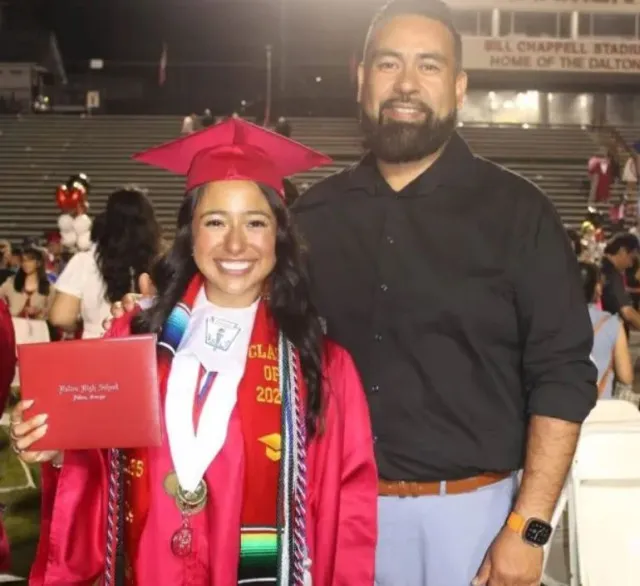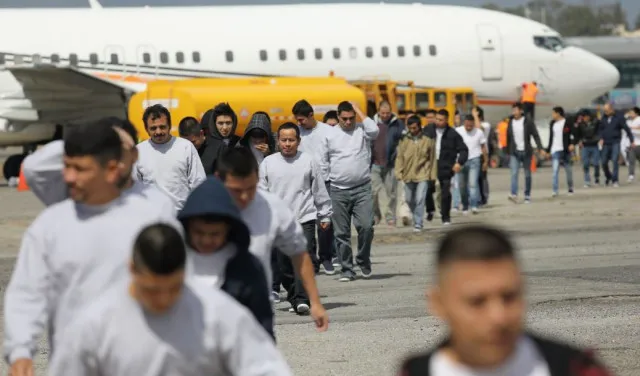A Simple Traffic Stop That Changed Everything
It all started with a red light. On May 5, 2025, 19-year-old Ximena Arias-Cristobal, a college student in Dalton, Georgia, was pulled over for running a red light and making an illegal turn. What seemed like a routine traffic citation quickly unraveled into something far more serious—one that could upend her entire life.
Ximena’s story has sparked a wave of concern and debate about immigration enforcement, civil rights, and how a single mistake can expose years of hidden reality. Now, she faces deportation after the traffic stop revealed that she and her family have been living in the United States without legal documentation for over a decade.

Who Is Ximena Arias-Cristobal?
Ximena is not just any student. She’s been a part of the Dalton community since she was four years old, brought to the U.S. from Mexico City in 2010 by her parents. She grew up in Georgia, attended local schools, and currently studies at Dalton State Community College.
Despite living in Georgia for most of her life, she pays out-of-state tuition because of her immigration status. She doesn’t qualify for federal aid, and she has always had to find her own way through school—working part-time jobs, borrowing textbooks, and relying on friends and community members for support.
Video: Student, father detained by ICE after separate traffic stops, family demands answers
The Traffic Violation That Sparked a Federal Investigation
On the day of her arrest, officers pulled Ximena over for failing to obey a traffic signal. When asked for her driver’s license, she initially claimed to have an international license but later admitted that she did not possess one at all. She also revealed that her mother had taken the document from her and forbade her from driving.
From that moment, things escalated. Officers contacted the vehicle’s registered owner—believed to be Ximena’s mother—but communication was limited, as neither parent could speak English. After verifying that she had no valid U.S. license, police charged her and transported her to Whitfield County Jail, a facility that partners with U.S. Immigration and Customs Enforcement (ICE) under the 287(G) program.

What Is the 287(G) Program and Why Does It Matter?
The 287(G) program is a federal initiative that allows local law enforcement to assist ICE in identifying and detaining undocumented immigrants. It’s a controversial measure, and its role in Ximena’s case has reignited national conversations about its fairness and effectiveness.
Because Whitfield County participates in this program, Ximena’s arrest automatically triggered a federal immigration screening. Once in the system, it didn’t take long for ICE to confirm her undocumented status. She was transferred to Stewart Detention Center in Lumpkin, Georgia, a facility known for holding immigrants awaiting deportation proceedings.

Family Ties and a Deeper Crisis
Ximena’s detention wasn’t an isolated event. Just a few weeks earlier, her father, Jose Francisco Arias-Tovar, was arrested for speeding and also flagged by ICE. He remains in custody at Stewart and has been denied legal permission to stay in the U.S. It’s unclear if he ever sought permanent residency or citizenship.
With both father and daughter detained, the spotlight has turned toward the family’s history. They’ve lived in Dalton for 15 years, operating a small business and quietly building a life. But now, the entire household faces possible deportation, with immigration attorney Terry Olsen warning that Ximena’s mother could be the next to be detained—and deported—within weeks.
Video: Georgia College Student Faces Deportation After Red Light Violation 🚨
Why Ximena Doesn’t Qualify for DACA Protection
For many undocumented youth in the U.S., the Deferred Action for Childhood Arrivals (DACA) program has offered a lifeline. But not for Ximena. She was brought to the U.S. in 2010—just one year after DACA’s cutoff eligibility date. That one-year difference means she’s not protected by a program designed specifically to help young people like her.
Without DACA status, she has no work permit, no legal identification, and no protection from deportation. And now, with her arrest on record, the odds of finding relief through other legal channels are even slimmer.

Community Outcry and the Human Cost of Policy
Since Ximena’s arrest, people in Dalton and beyond have rallied to support her. A former employer, Hannah Jones, launched a GoFundMe campaign to raise money for legal representation and bond fees. Community members are signing petitions, making phone calls, and raising awareness about her case.
Immigration attorney Terry Olsen has publicly criticized ICE for its handling of such cases, arguing that federal agents rarely take the time to review a person’s full file before initiating deportation proceedings. He also warned that keeping families together is often not a priority during enforcement actions.
Olsen believes that cases like Ximena’s expose the cracks in a system that often punishes people who had no choice in how they arrived in the country—and who have since become productive members of society.

What Happens Now?
Ximena’s future is uncertain. She remains in federal custody as her legal team works to explore any possible defense options. Deportation is still on the table. And with both parents potentially being removed from the country, the family’s entire life in Georgia hangs in the balance.
This case is more than just about a traffic stop. It’s about the human side of immigration policy. It’s about what happens when the law collides with real lives—students, workers, neighbors—who’ve been here for years and only want to continue building a future.

Conclusion: A Life Disrupted by a Red Light
What began as a minor traffic violation has morphed into a life-altering crisis for Ximena Arias-Cristobal and her family. Her arrest has exposed the fragility of living undocumented in America, especially under laws that offer little mercy and few second chances.
As the legal battle continues, Ximena’s story serves as a powerful reminder of how thin the line is between normal life and chaos for millions of undocumented individuals across the country. One turn on red—and everything changes.